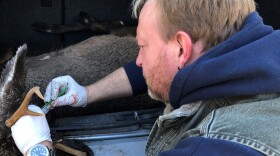-
When salt marshes are under stress, they degrade, and actually release carbon into the atmosphere. Scientists in Maine recently unlocked a mystery that helps explain what's happening to marshes — and how to restore them.
-
This year alone has seen record high water levels in several places, including Bar Harbor, Cutler and Wells. For coastal communities it means threats to buildings and infrastructure, loss of beaches and intrusion of salt water into private wells.
-
A mid-sized project in York County that's part of the state's new "community solar" program is just about to go live.
-
Lubelczyk says York County is a bellwether for northern counties. Deer ticks are expanding their range, and that's fueled, in part, by mild winters brought on by climate change. And in southern Maine, warmer winters make York County a potential home for new populations of ticks.
-
The Portsmouth Naval Shipyard in Kittery is hardening its own historic facilities against higher tides, and adding flexibility to on-site energy systems.
-
While many communities are responding to climate change in their own ways — from installing solar panels and new culverts to opening cooling centers and forming special committees — few have made far-ranging plans that account for their own unique populations, resources and vulnerabilities.
-
In York County, a group of students interested in the coastal ecosystem led to the creation of a national nonprofit that hopes to activate 10 million youth in the next four years.
-
This story is part of our series "Climate Driven: A deep dive into Maine's response, one county at a time" — Maine's changing climate is increasing the possibility of more and bigger fires and now, like in California, prescribed burns are being used in York County as a fire management tool.
Bangor Studio/Membership Department
63 Texas Ave.
Bangor, ME 04401
Lewiston Studio
1450 Lisbon St.
Lewiston, ME 04240
Portland Studio
323 Marginal Way
Portland, ME 04101
Registered 501(c)(3) EIN: 22-3171529
© 2026 Maine Public
63 Texas Ave.
Bangor, ME 04401
Lewiston Studio
1450 Lisbon St.
Lewiston, ME 04240
Portland Studio
323 Marginal Way
Portland, ME 04101
Registered 501(c)(3) EIN: 22-3171529
© 2026 Maine Public

Play Live Radio
Next Up:
0:00
0:00
Available On Air Stations
Scroll down to see all available streams.








